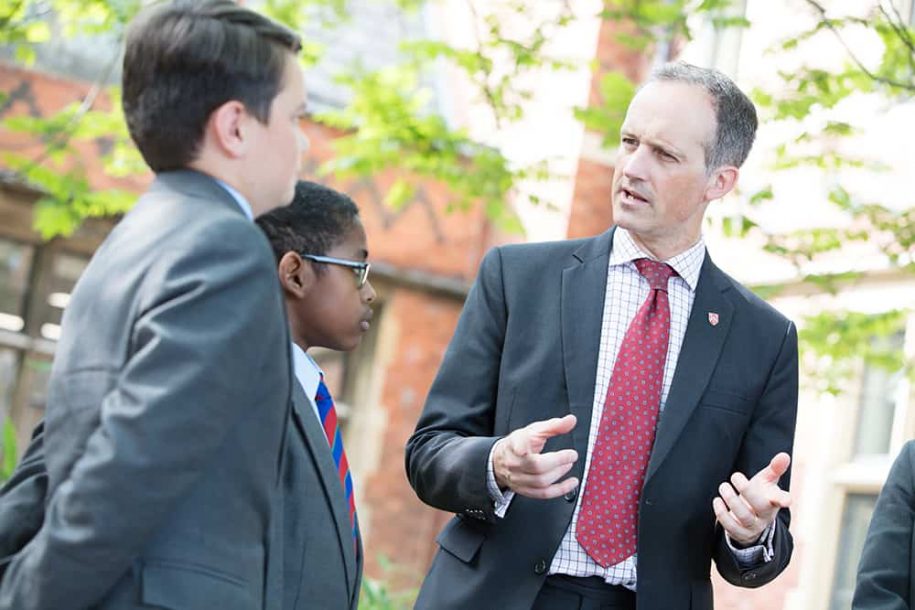Emotional Intelligence

<strong>Emotional Intelligence</strong>
<strong> </strong>I am never prouder of Loughborough Grammar School boys than at our annual Open Day in the Autumn. Last Saturday, we were blessed with a glorious sunny morning with the Quad looking resplendent against a deep blue sky. But however impressed visitors are with our buildings, whether traditional like the Quad or state-of-the-art like our Science facilities, they leave LGS focusing on how impressive they found the young men whom they met. I wrote a blog on the importance of alternative forms of intelligence last May, and it is the emotional intelligence of our boys that stands out on such an occasion above even their academic achievements.
A few weeks ago, I found an article on the BBC website listing <a href=”https://www.bbc.co.uk/news/education-41469041″>eight questions</a> that parents should ask the Headteacher when visiting a school Open Day. I agreed with some, if not all. Geoff Barton, who runs the Association of School and College Leaders (ASCL), is quoted as say that schools always ‘wheel out (only) their star pupils for Open Day’. This made me feel incredibly fortunate, as at LGS we never even have to ask ourselves the question about whom to pick to show visitors around the campus. All Sixth Formers are asked to participate, and we know from experience that we can rely on them to speak with authority and warmth about their school. Even if they are irritated by a particular aspect of school life at that time, they have acquired the emotional maturity to put this to one side and to describe the bigger picture. Prospective parents always comment on how articulate their guides are, and on the fondness they have for their school and for their peers. “He was confident without sounding remotely arrogant” is feedback I have heard on countless occasions. Indeed, this may well be the recollection from your own first visit here.
Of course, if we have been successful in developing well-rounded young men at LGS, it is because your values as parents are in tune with those of the school. However, there is also the issue of opportunity. One of the experiences that I want to give each boy repeatedly during his LGS education is that of speaking in public. At the Open Day, boys of all ages volunteered to help departments with their displays, and thereby had the experience of explaining quite why they enjoyed Chemistry or History so much. Two Year 8 boys even contributed to the main presentation that I gave to parents in the Hodson Hall – I was astounded by their articulacy, humour and love of the school.
Re-watching ‘A Theory of Everything’, the film about Stephen Hawking’s life, reminded me of the importance of how we communicate. What made Hawking so remarkable was not just the ideas that he formulated. He was masterful, even through a computer and artificial voice box, at explaining complex ideas, often with a self-deprecating humour. ‘Knowing’ one’s subject, acquiring top grades is not enough to have success in one’s chosen career. We must learn how to communicate our knowledge, and this is why we are seeking to create more and more opportunities for boys to step up and present in front of an audience.
Compared to when we were at school, boys spend a lot more time talking in lessons. My memories of my secondary education are largely of listening in silence and copying copious notes from the blackboard. In a more dynamic society and economy, the ability to persuade and convince has risen to the fore. Educational research claims that students retain only about 10% of what they hear, but up to 70% of what they say. Using one’s own words to describe complex ideas is certainly, from my teaching experience, a powerful way of ensuring that key concepts become ingrained in learning.
Outside the classroom, we have more and more speaking opportunities. In Year 7, Mr Korosi is now organising a public speaking competition in which all our youngest boys participate. Debating is thriving under the leadership of Mr Morris and Mr Hunter, while a number of departments run stimulating debates under the auspices of their subject societies. All boys are assessed on their speaking skills as part of the new GCSE English Language, receiving a separate grade for this component, and I particularly enjoy the presentations evening of the EPQ (Extended Project Qualification) when boys have to explain highly technical research projects to an audience of laymen including parents and the Headmaster. Finally, I have been delighted that a number of senior boys have taken up the gauntlet of addressing School Assembly. How many teenagers have the chance to speak to over 1000 people?!
As I have been away at the annual Heads’ Conference this week, I am yet to thank boys in assembly for the incredible way in which they projected the Grammar School at Open Day. Please pass on these comments, and make sure that, even during the examinations years, that they seek opportunities to develop their emotional intelligence through co-curricular activities and engagement with the outside world.
